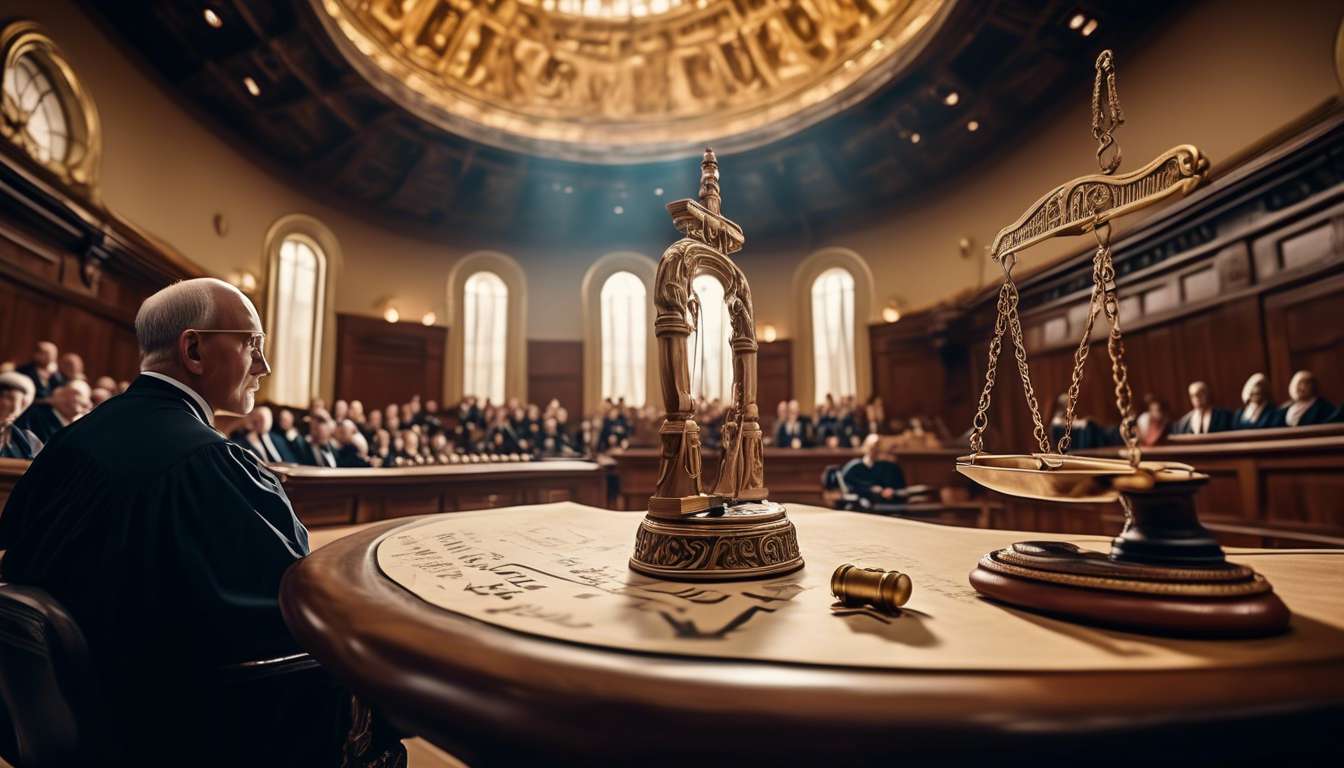As we delve into the intricate world of sports betting and its legal landscape, we are drawn to a pivotal moment in history: the Supreme Court’s decision that reshaped the industry. This landmark ruling overturned the federal ban on sports betting, altering the course of both the sports and gambling industries.
The Decision-Making Process:
This decision was not made lightly. It involved:
- Careful deliberation
- Diverse opinions
- A profound understanding of the law’s impact on states’ rights and economic futures
Exploring the Justices’ Stances:
We aim to unravel the complexities behind each justice’s stance, revealing their motivations and legal reasoning. By examining the votes and the dynamics within the court, we gain insights into:
- How this landmark ruling came to be
- Who among the justices voted to overturn the federal ban on sports betting
Impact of the Decision:
The decision has left an indelible mark on both national policy and our cultural landscape. It highlights the intricate balance between:
- National interests
- States’ rights
- Economic implications
This narrative provides a deeper understanding of a decision that has significantly influenced the sports betting industry and its regulatory environment.
Justices’ Backgrounds and Legal Expertise
Many of the justices bring diverse legal expertise and backgrounds that influence their perspectives on sports betting legislation.
As we explore the Supreme Court’s decision-making process, we see how each justice’s unique experiences contribute to the complex discussions and rulings. Our collective understanding grows richer when we consider how these varied backgrounds shape their interpretations of the law.
We recognize that:
-
Some justices have extensive experience in constitutional law, allowing them to delve deeply into the implications of sports betting on our legal landscape.
-
Others might have backgrounds in commercial law, providing insights into the economic and regulatory aspects of sports gambling.
This diversity is crucial as it ensures a more comprehensive examination of the issues at hand.
Together, we appreciate how this blend of expertise and backgrounds enriches the Supreme Court’s deliberations. It helps us feel connected to a judicial process that respects and reflects the complexities of our society, particularly in the evolving arena of sports betting legislation.
Factors Influencing the Justices’ Votes
Several key factors shape how justices cast their votes on sports betting cases, including legal precedents, personal values, and societal impacts.
Legal Precedents
When examining the Supreme Court’s decision-making process, it’s clear that justices weigh past rulings heavily. They strive to maintain consistency with established legal frameworks, ensuring that sports betting decisions align with prior judgments. This approach fosters a sense of stability and fairness within our legal community.
Personal Values
Personal values also play a significant role. Each justice brings their unique perspectives and beliefs to the bench, influencing how they interpret the law. We often find that these personal convictions can sway votes, especially in cases where the law seems ambiguous.
Societal Impact
Furthermore, the societal impact of sports betting decisions can’t be understated. Justices consider how their rulings will affect:
- Communities
- Economies
- The moral fabric of society
By balancing these factors, the Supreme Court aims to render decisions that reflect both legal principles and the broader needs of our nation.
Key Arguments Presented in Court
A central argument focuses on states’ rights to regulate sports betting independently of federal oversight. We emphasized how this autonomy aligns with the Tenth Amendment, believing that states should have the power to decide their own laws regarding sports betting.
The Supreme Court’s decision-making process was heavily influenced by this notion of state sovereignty, which resonated with many of us who value local control and community-driven decisions.
During the proceedings, we argued that the federal Professional and Amateur Sports Protection Act (PASPA) unfairly restricted states. It was evident that PASPA’s constraints prevented states from responding to their citizens’ evolving views on sports betting.
By framing sports betting as a state issue, we aimed to highlight the importance of empowering local governments rather than enforcing a blanket federal mandate.
Our discussions recognized that allowing states to manage sports betting could potentially:
- Boost local economies
- Create a sense of unity
Thus, the Supreme Court’s deliberation on this matter was crucial in shaping the future landscape of sports betting nationwide.
The Role of Precedents in the Decision
Several key precedents played a crucial role in shaping our understanding and arguments regarding the legality of sports betting. As we delved into the Supreme Court’s decision-making process, we recognized how past rulings influenced the contours of this landmark case.
One pivotal precedent was the 1992 federal law, the Professional and Amateur Sports Protection Act (PASPA), which effectively banned state-authorized sports gambling. It was crucial for us to examine how this law’s interpretation by the courts had evolved over time.
Additionally, the precedent set by the Court in cases related to states’ rights and federalism heavily impacted our arguments. By analyzing how the Supreme Court previously handled conflicts between federal and state authority, we could better understand the potential outcomes of our sports betting case.
Our shared journey through these precedents not only informed our strategies but also connected us as advocates for legal clarity and fair decision-making within the realm of sports betting.
Controversies Surrounding the Ruling
Many critics argue that the ruling on sports betting has sparked significant debate over states’ rights versus federal oversight. The Supreme Court’s decision-making process was not straightforward. The ruling empowered states to regulate sports betting independently, but it raised questions about the balance of power in our federal system.
Some feel that this decision could set a precedent for future cases where states might challenge federal authority.
The decision-making process was complex, involving:
- Interpretations of the Constitution
- Consideration of past precedents
The Justices had to weigh the implications of their decision not just on sports betting, but on how power is distributed across our nation.
Within our community, opinions are divided:
- Some believe the ruling fosters innovation and economic growth.
- Others worry about the potential for increased gambling-related issues.
As we navigate this new landscape, we’re reminded of the ongoing dialogue about our collective values and governance.
Public and Industry Reactions
The ruling has elicited a wide range of responses from both the public and industry stakeholders, highlighting diverse perspectives on its potential impact. Many of us in the community find ourselves caught between excitement and concern.
The Supreme Court’s decision-making process, which led to the authorization of sports betting, has sparked enthusiasm among those who see it as a chance to:
- Boost local economies
- Increase sports engagement
It’s easy to feel a sense of anticipation about the opportunities this might unlock.
However, not everyone shares this enthusiasm. Some express caution, worrying about the societal implications and the potential for increased gambling addiction.
Within the industry, businesses are gearing up for new ventures, eager to capitalize on this fresh market landscape. We’re witnessing a dynamic shift as companies strategize to align with the ruling.
As we navigate these changes, it’s essential that our voices contribute to a balanced conversation, ensuring that our communities remain informed and engaged in this evolving dialogue.
Legal Implications and Future Projections
The recent ruling ushers in significant legal changes that we must navigate carefully as we forecast the future of sports betting. The Supreme Court’s decision has opened new avenues for us to consider how states will regulate this industry.
As a community, we must ensure that our collective interests are represented in this evolving landscape. This ruling doesn’t just change the law; it reshapes our cultural and economic fabric.
We see the potential for increased revenue streams that could benefit public projects. However, there are also ethical considerations to weigh. Our participation in the decision-making process is crucial. We need to actively engage with policymakers to define regulations that balance opportunity with responsibility.
Looking forward, we can anticipate a more inclusive dialogue about how sports betting fits into our society. By staying informed and involved, we can help steer this change in a direction that aligns with our shared values and aspirations.
Unraveling the Decision-Making Process
We need to delve into the intricate steps and considerations that led to this landmark ruling. As a community interested in the Supreme Court’s decision-making process, we understand the importance of each justice’s perspective.
The case surrounding sports betting required us to examine:
- Constitutional interpretations
- State rights
- Potential societal impact
Each justice weighed these factors, contributing to a decision that reshaped the landscape of sports betting in America.
We recognize the deep analysis that went into interpreting the Professional and Amateur Sports Protection Act’s alignment with the Constitution. The justices didn’t take this lightly.
They balanced:
- Legal precedent
- Evolving views of federalism
Ultimately, they decided to give states the autonomy to regulate sports betting.
By understanding this process, we connect with the broader legal community, sharing an appreciation for the rigor and discipline involved in such decisions. Together, we witnessed a pivotal moment that underscores the dynamic nature of our legal system.
Conclusion
Exploring Supreme Court Sports Betting Decisions
You’ve delved into the intricate world of Supreme Court sports betting decisions. By analyzing the Justices’ backgrounds, key arguments, and legal implications, you’ve gained insight into the decision-making process.
Key Aspects Analyzed:
-
Justices’ Backgrounds: Understanding the personal and professional histories of the Justices can provide context to their perspectives and decisions.
-
Key Arguments: Analyzing the arguments presented by both sides offers a comprehensive view of the legal reasoning and challenges involved.
-
Legal Implications: The ruling’s impact on existing laws and future legal interpretations is crucial to understanding its broader significance.
Controversies and Public Reactions:
The controversies surrounding the decision and the diverse public reactions further highlight the significance of this ruling.
-
Public Opinion: Varied responses from different sectors of society reflect the complexity and divisiveness of the issue.
-
Stakeholder Impact: Consideration of how the ruling affects stakeholders, including sports leagues, gambling industries, and state governments.
Reflections and Insights:
Reflecting on these complexities has deepened your understanding of how the Supreme Court shapes the legal landscape of sports betting.
-
Legal Landscape: The decision contributes to the evolving legal framework within which sports betting operates in the United States.
-
Future Directions: Insights gained offer a foundation for predicting future legal and regulatory developments in this area.
Conclusion:
Your exploration has enhanced your comprehension of the Supreme Court’s role in influencing and directing the legal dynamics of sports betting in the country.

